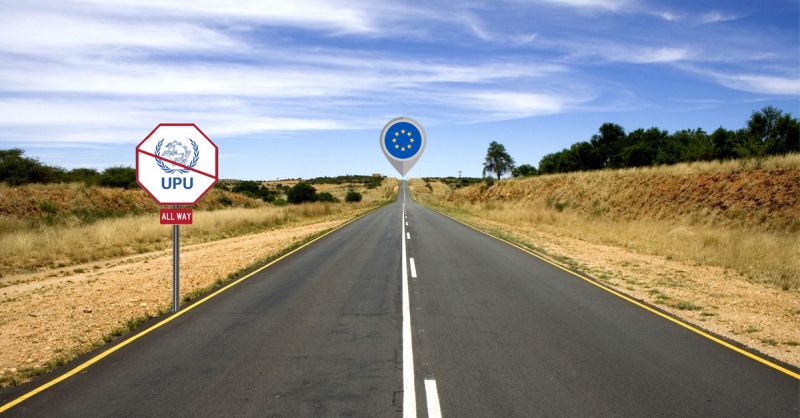Why cross-border postal item volumes (UPU) in the EU are declining

𝗧𝗛𝗘 𝗙𝗨𝗧𝗨𝗥𝗘 𝗢𝗙 𝗘𝗖𝗢𝗠𝗠𝗘𝗥𝗖𝗘 𝗟𝗢𝗚𝗜𝗦𝗧𝗜𝗖𝗦 𝗦𝗘𝗥𝗜𝗘𝗦 𝗕𝗬 𝗖𝗟𝗦
𝗗𝗲𝘃𝗲𝗹𝗼𝗽𝗺𝗲𝗻𝘁𝘀 𝗶𝗻 #𝗘𝗨 𝗰𝗿𝗼𝘀𝘀-𝗯𝗼𝗿𝗱𝗲𝗿 𝗲𝗰𝗼𝗺𝗺𝗲𝗿𝗰𝗲 𝗶𝗻 𝟮𝟬𝟮𝟭:
pandemic, rising UPU tariffs, IOSS 2021 has seen several developments to date:
(1) During the #pandemic #ecommerce volumes rose sharply. In #Europe, it was primarily the domestic markets that benefited, with #crossborder volumes stagnating or even declining, due mainly to the temporary interruption of cross-border #logistics connections (especially air freight). Noticeably the #postalchannel was most affected and failed to adapt as quickly as their competitors. Consequently, the postal channel has become significantly less relevant to the ecommerce #deliverymarket segment, and this #development is ongoing.
(2) #UPU rates (terminal dues, item/kilo basis) tariffs continued to rise. As a result, postal products, services, and rates – as determined by the UPU – are becoming much less attractive than those offered by competitors.
(3) On 1 July 2021 the #EU #VAT #Ecommercepackage and the new Import-One-Stop-Shop (#IOSS) VAT model came into force. The #model is intended to simplify the import of Low Value Consignments (LVC) up to 150 EUR value of goods. It works in principle, but there have been challenges in aligning the UPU Global Postal Model with the EU VAT Ecommerce packages.
𝗘𝗨 𝗽𝗼𝘀𝘁𝗮𝗹 𝗼𝗽𝗲𝗿𝗮𝘁𝗼𝗿𝘀 (𝗗𝗢) 𝗵𝗮𝘃𝗲 𝘂𝘀𝗲𝗱 𝘁𝗵𝗲 𝗜𝗢𝗦𝗦 𝘀𝗰𝗵𝗲𝗺𝗲 𝘁𝗼 𝗰𝗿𝗲𝗮𝘁𝗲 𝗮 𝗵𝗶𝗴𝗵𝗹𝘆 𝗶𝗻𝗵𝗼𝗺𝗼𝗴𝗲𝗻𝗲𝗼𝘂𝘀 “𝗳𝗲𝗲 𝗿𝗲𝗴𝗶𝗺𝗲”. 𝗧𝗵𝗶𝘀 𝗵𝗮𝘀 𝗲𝘀𝘀𝗲𝗻𝘁𝗶𝗮𝗹𝗹𝘆 𝘁𝗲𝗿𝗺𝗶𝗻𝗮𝘁𝗲𝗱 𝘁𝗵𝗲 𝘀𝗶𝗻𝗴𝗹𝗲 𝗘𝗨 𝗽𝗼𝘀𝘁𝗮𝗹 𝘁𝗲𝗿𝗿𝗶𝘁𝗼𝗿𝘆 𝗳𝗼𝗿 𝗰𝗿𝗼𝘀𝘀-𝗯𝗼𝗿𝗱𝗲𝗿 𝗟𝗩𝗖.
Prior to 1 July 2021, almost all postal shipments were valued at below EUR 22. No #customsduty or #importsalestax needed to be paid, and no fees were charged by postal companies for customs handling. From 1 July 2021, import VAT is now due on each and every shipment, whatever their value.
(1) If the postal company is required to collect the import VAT (if IOSS is not applied), a fee is charged for this service – the size of the fee already varies considerably by EU destination country.
(2) It gets even more complicated where the shipper uses IOSS: As the import VAT is already paid at checkout, import VAT does not need to be collected. Some EU designated postal operators (DO) do not charge any fees on IOSS shipments, while others charge for digital presentation of the declaration data.
Understanding the multitude of different fee systems has become a science. We are already seeing unhappy consumers and a concomitant shift in volumes from the “traditional” UPU postal channel to individual agreements with DOs and, above all, to commercial shipping solutions.
Click here for the LinkedIn-Article.

Walter Trezek
Document Exchange Network GmbH

